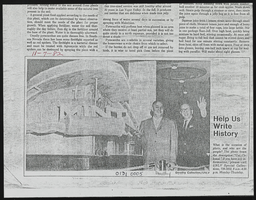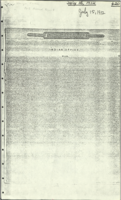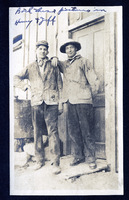Search the Special Collections and Archives Portal
Search Results

Photograph of Boyd and Prell, image 002
Date
Description
Image

Moapa River Indian School Annual Report, 1912
Date
Archival Collection
Description
Department of the Interior, United States Indian Service 1912 annual report of the conditions on the Moapa River Reservation School. Section I includes reservation law and order. Section II includes reservation health.
Text
"Samantha Stupak the Dog" news segment: video
Date
Archival Collection
Description
Dr. David Tack with "Samantha Stupak" the dog talking about a dangerous disease called "wobble" syndrome. Original media VHS, color, aspect ratio 4 x 3, frame size 720 x 486. From the Bob Stupak Professional Papers (MS-01016) -- Professional papers -- Audiovisual material -- Digitized audiovisual clips file.
Moving Image
"Samantha Stupak the Dog" news segment: video
Date
Archival Collection
Description
Dr. David Tack with "Samantha Stupak" the dog talking about a dangerous disease called "wobble" syndrome. Original media VHS, color, aspect ratio 4 x 3, frame size 720 x 486. From the Bob Stupak Professional Papers (MS-01016) -- Professional papers -- Audiovisual material -- Digitized audiovisual clips file.
Moving Image
Campbell Family Photograph Collection
Identifier
Abstract
The Campbell Family Photograph Collection is comprised of nine black-and-white photographic reprints of Pioche, Nevada and two photographic reprints of Dr. Linwood Campbell, taken from approximately 1895 to 1929 and reprinted between approximately 1950 and 1969.
Archival Collection
Nevada State Board of Education Questions for the Examination of Teachers
Identifier
Abstract
Nevada State Board of Education Questions for the Examination of Teachers (1894) consists of a single test booklet from the Nevada State Board of Education containing questions to test the knowledge of teachers. The test includes questions from subjects such as physiology, reading, orthography, geography, and United States history.
Archival Collection
C. A. Earle Rinker Photograph Collection of Goldfield, Nevada
Identifier
Abstract
The C. A. Earle Rinker Photograph Collection of Goldfield, Nevada (approximately 1900-1915) contains individual black-and-white photographic prints, photographic albums, black-and-white and tinted postcards, and photographic negatives that document the history of early twentieth century Goldfield, Nevada. The images include photographic prints of Goldfield and surrounding areas during its peak years of 1906-1910; postcards showing scenes of Goldfield, Tonopah, and other areas in central Nevada; and negatives that contain images of Rinker's family and homelife in Indiana and Illinois.
Archival Collection

Mabel Hoggard: teaching materials
Date
Archival Collection
Description
Folder of materials from the Mabel Hoggard Papers (MS-00565) -- Educational work and legacy file. This folder includes teaching contracts, a Clark County School District Las Vegas Area map, teacher-student guidelines, newsletters, a conference booklet, a speech transcript, and other documents related to Mabel Hoggard's teaching career.
Mixed Content

Transcript of interview with David Wasserman by Barbara Tabach, October 21, 2016
Date
Archival Collection
Description
For nearly two decades between 1950 and 1970, only one dentist of Jewish ancestry was known to be licensed to practice in Nevada. That was Dr. Joe Chenin. Finally, in 1971, the steadfast and easy mannered Dr. David R. Wasserman (1944 - ) broke through the barrier to become the second Jewish dentist serving the Las Vegas community. Over the following years, Dr. Wasserman built a sizeable following and immersed himself in the Jewish community of Las Vegas. Among his achievements is his participation and leadership in the formation of Las Vegas’ first Reform Jewish synagogue, Congregation Ner Tamid. He also would be active in the Jewish Federation. In 1992, as the HIV-AIDS epidemic affected dental offices throughout the nation, Dr. Wasserman saw an opportunity to get ahead of the infection. With the help of his wife Juanita Davis-Wasserman and his father-in-law Warren Davis, he developed, patented, manufactured and distributed a disposable tip for a treatment instrument commonly found in dental offices called a tri-syringe. This disposable tip brought sanitary options and great financial fortune to Dr. Wasserman and his family. In this oral history, Dr. Wasserman reflects on his joy of living in Las Vegas. He is a highly regarded dentist and leader in the Jewish community.
Text

Photograph of Dalta Hurry and Raymond Jefferson, Goldfield (Nev.), early 1900s
Date
Archival Collection
Description
Image
